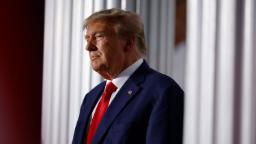

Washington
CNN
—
Former President Donald Trump was arrested and arraigned on federal charges this week in a never-before-seen moment in American political and legal history that captured the attention of a nation that has for years been captivated by his norm-busting episodes.
The former president’s booking at a federal courthouse in Miami on charges related to his alleged mishandling of classified government documents is just the latest twist in his post-presidency legal drama – which has now become a key issue in the GOP primary contest as Trump mounts a third White House bid.
Here’s the latest on Trump’s legal troubles:
On Tuesday, Trump pleaded not guilty to 37 charges related to his alleged mishandling of classified documents.
“We most certainly enter a plea of not guilty,” Trump attorney Todd Blanche told the judge.
Trump’s aide and co-defendant, Walt Nauta, was also arrested, fingerprinted and processed. He had an initial appearance Tuesday but will not be arraigned until June 27.
The DOJ recommended that both Trump and Nauta be released with no financial or special conditions. Prosecutor David Harbach said that “the government does not view either defendant as a flight risk.”
The federal criminal charges Trump faces were brought following an investigation by special counsel Jack Smith, who attended Tuesday’s arraignment.
In the indictment unsealed last week, the Justice Department charged Trump with 37 felony counts, alleging he illegally retained national defense information and that he concealed documents in violation of witness-tampering laws in the Justice Department’s probe into the materials.
The charges are drastically more serious than those he faces in a separate New York case and present the possibility of several years in prison if Trump is ultimately convicted.
For his part, Nauta, who serves as Trump’s personal valet, faces six counts, including several obstruction- and concealment-related charges stemming from the alleged conduct.
In her first order after the indictment,US District Judge Aileen Cannon – a Trump appointee – told DOJ and Trump attorneys’ parties to get the ball rolling to obtain security clearances for the lawyers who will need them.
Both of Trump’s attorneys – Blanche and Chris Kise – have already been in touch with the Justice Department about obtaining the necessary security clearances to try the case, a source familiar with the outreach told CNN Thursday evening.
Cannon’s order reflects how the case concerns highly sensitive, classified materials – adding another layer of complexity to the high-stakes, first-of-its-kind federal prosecution of a former president.
How long the proceedings stretch out, and whether the trial takes place before or after the 2024 election, will depend in part on how efficiently Cannon manages her docket. Thursday’s move by Cannon suggests an interest, at least for now, in moving the proceedings along without delay.
In an expected, procedural step Friday, Smith’s team asked the judge to bar Trump and his defense team from publicly disclosing some of the materials shared in the criminal case as part of the discovery process. Lawyers for Trump and Nauta do not oppose the requested protective order, according to the new filing, and Cannon has referred the matter to a magistrate judge.
Trump had already been indicted earlier this spring in a separate case, this one brought by Manhattan District Attorney Alvin Bragg in New York state court.
Trump has been charged with 34 felony counts of falsifying business records over hush money payments made during the 2016 campaign to women who claimed they had extramarital affairs with Trump, which he denies. Trump has pleaded not guilty to all charges.
The case has remained relatively quiet since Trump pleaded not guilty to all of those charges in April, with the judge setting a trial date in New York County for March 2024.
Still, the former president’s legal team has been attempting to move the case to federal court, and on Thursday his attorneys asked a federal judge to deny Bragg’s motion to remand the case back to the state Supreme Court, again arguing that the charges are related to his duties as president and therefore should not be heard in state court.
A hearing on the issue is scheduled for June 27.
Trump still has other active investigations looming over him, including a probe by Smith, the special counsel, into the January 6, 2021, US Capitol riot and efforts to overturn the 2020 election.
And in Georgia, Fulton County District Attorney Fani Willis has recently indicated that she’s likely to make charging decisions public in August as part of her probe into efforts by Trump and his allies to overturn the 2020 election in Georgia.
In a letter obtained by CNN last month, Willis announced remote workdays for her staff in August and asked judges to refrain from in-person hearings for parts of that month.
Trump has insisted that any criminal charges will not stop his 2024 campaign, and so far he’s keeping to that commitment.
On Wednesday, his campaign said it had raised more than $7 million since the former president was indicted in the federal case.
“The donations are coming in at a really rapid pace,” campaign spokesman Steven Cheung said in an email.
Meanwhile, his GOP primary opponents have been weighing in on the new charges in a number of different ways, with some casting the prosecution as political while also stressing that the charges are concerning.
Trump can still run for president after being indicted or if he is eventually convicted.
Still, the existing indictments, as well as a potential conviction ahead of the 2024 election, could make it more difficult for Trump to win back the White House.
